#jahl
Photo

GX Month Week 2, Prompt: Soulmates
THIS TOOK ME FVE DAYS BUT IT EXITS. I didn't even bother with full lines, I just colored the sketch. I'll clean it up and add shading later.
Soulmate prompt really grabbed me like "YOU WILL ART NOW YOU WILL MORE ART THAN YOU HAVE EVER ARTED IT WILL BE A MASTERPIECE". Not sure I'm entirely happy with it but oh well.
From the top:
Hersha and Tre, the first life, the prince and his knight.
Jahl and Yoshua, the battle between the first Supreme King and the King of Light.
Njal and Rune, the one left waiting for the one who never came back.
And of course our loveable idiots obliviously playing cards.
#gxmonth2022#YGO GX#yugioh gx#yu gi oh gx#jaden yuki#yuki judai#jesse anderson#johan andersen#across the stars#Hersha Danker Shatten#Tre Rossher#jahl#The Supreme King#haou gx#yoshua leighton#njal#rune#Meda's Art
55 notes
·
View notes
Text
The Biggest Problem
The greatest affliction that has befallen the Muslims is al-jahl (ie: ignorance).
أعظم ما أصيب به المسلمون هو الجهل.
Muqbil b. Hādī al-Wādiʿī, al-Bashāʾir fī ʾl-Samāʿ al-Mubāshir 1/22 #20
مقبل بن هادي الوادعي، البشائر في السماع المباشر ١/٢٢ #٢٠
https://archive.org/details/shaykh_muqbil-al_bashaair_fi_as_samaa-almubaashir/page/n23/mode/1up
Telegram: https://t.me/aljadwal
Tumblr: https://al-jadwal.tumblr.com
5 notes
·
View notes
Text
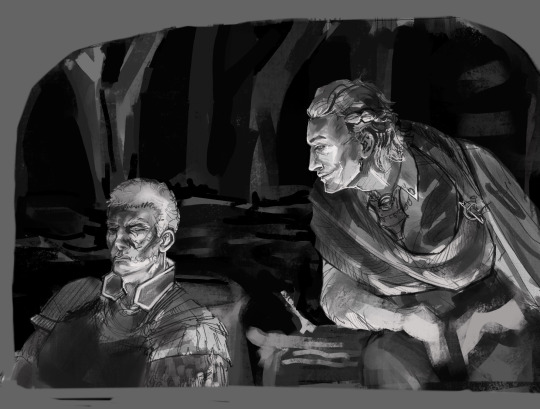
Sometimes your best friend is an immortal executioner and you are an annoying scholar trying to convince him to say more than the word ‘fuck’ so you can write a book about him
#spoiler alert; Gregory cant say a sentence without the word fuck#Gregory carvor#rymus jahl#as above so below; the godtooth#oc#procreate#wip
8 notes
·
View notes
Quote
أبو جهل
قصة أبو جهل عم الرسول.. وماذا جرى بينه وبين الرسول محمد صلى الله عليه وسلم - نبض العرب
0 notes
Text
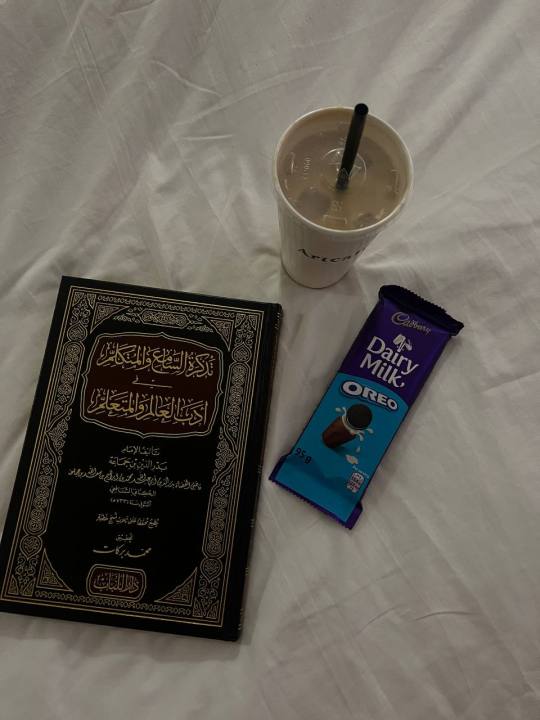
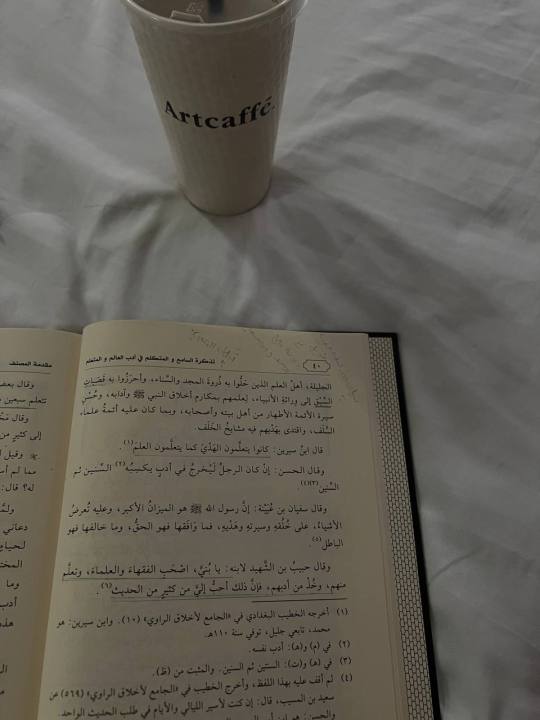
Some of the salaf used to say:
خير المواهب العقل وشرّ المصائب الجهل
The best thing that a person can be gifted with is aql (intellect), and the worst thing that a person can be afflicted with is jahl (ignorance).
تذكرة السامع والمتكلم ١/٨
#islam#islamicreminder#islamicadvice#islamicart#islamicquotes#islamic#quote#allah#hijab#knowledge#inspirational quotes#islam4 life#jilbab#la ilaha illa allah#quranic#quran online#quran kareem#holy quran#quran
89 notes
·
View notes
Text
SKINS character’s birth charts & personality type's in my opinion pt 1.
Tony Stonem

Sun - Aquarius
Moon - Leo
Rising - Aries
Mercury - Leo
Mars - Scorpio
Venus - Capricorn
Personality type - ENTJ Commander
Sid Jenkins

Sun - Pisces
Moon - Taurus
Rising - Cancer
Mercury - Taurus
Mars - Cancer
Venus - Gemini
Personality type - ISFP Adventurer
Cassie Ainsworth

Sun - Scorpio
Moon - Cancer
Rising - Aquarius
Mercury - Scorpio
Mars - Virgo
Venus - Leo
Personality type - INFP Mediator
Michelle Richardson
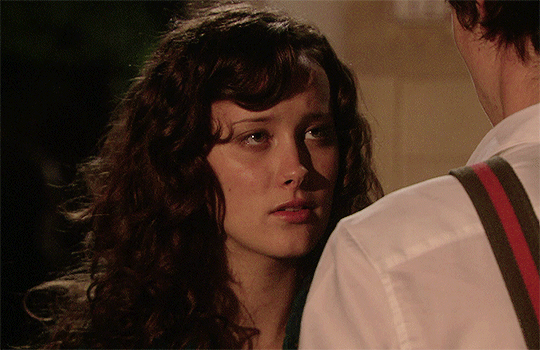
Sun - Libra
Moon - Aries
Rising - Pisces
Mercury - Libra
Mars - Pisces
Venus - Pisces
Personality type - ESFJ Consul
Chris Miles

Sun - Sagittarius
Moon - Cancer
Rising - Gemini
Mercury - Sagittarius
Mars - Aquarius
Venus - Scorpio
Personality type - ESFP Entertainer
Maxxie Oliver

Sun - Cancer
Moon - Sagittarius
Rising - Libra
Mercury - Cancer
Mars - Libra
Venus - Gemini
Personality type - ISFP Adventurer
Anwar Kharral

Sun - Capricorn
Moon - Gemini
Rising - Leo
Mercury - Capricorn
Mars - Gemini
Venus - Sagittarius
Personality type - ESFP Entertainer
Jahl Fazer

Sun - Aries
Moon - Scorpio
Rising - Taurus
Mercury - Aries
Mars - Libra
Venus - Virgo
Personality type - ISTJ Logistician
#skins generation 1#skins#tony stonem#skins effy#effy stonem#sid skins#cassie skins#michelle skins#skins aesthetic#personality type#personality types#mbti#star sign#astro community#astrology#zodiac#maxxie skins#sid jenkins#chris skins#tony skins#anwar skins#jahl skins#tony and michelle#sid and cassie#star signs#mbti types#skins cast#effy aesthetic#cassie ainsworth#birth chart
53 notes
·
View notes
Text
Six Things That Cause Someone to Go Astray
The six points:
1. Jahl (Ignorance)
2. Kawf (Fear)
3. Kibr (Pride/Arrogance)
4. Ḥasad (Jealousy)
5. Bad Companionship
6. Sins
Is it not the case that we have seen from our own brothers/sisters the likes of these points bringing about the ruin of those beloved to us.
– Jahl (ignorance): Have we not seen the effects of one being ignorant of the ʿAqīdah, heedless about his manhaj, slipping into the hands of the people of ḥizbiyyah?
– Kawf (Fear): Have we not seen someone become fearful of his; family traditions/expectations, cultural or peer pressure, eventually subsiding to the preferences of those who pressure him away from Islām?
– Kibr (Pride/Arrogance): Is it not the case that some have ‘rated’ themselves, looked down on others and claimed leadership for themselves or despised those who Allāh has give authority, leadership or fame to?
– Ḥasad (Jealousy): Such a common vice, envying knowledge, envying popularity, envying leadership to the point of severing relationships that were based upon righteousness and good companionship all due to being displeased with the Qadr of Allāh
– Bad Companionship: A foundation of correct ʿAqīdah, good companionship and spending time wisely, how is it destroyed? By the one who feels secure, not in need of guidance and good companionship so they entertain the companionship of the wicked or those unconcerned with upright moral character, those who do not act by ‘ad-dīnun-Naṣīḥah’ so slowly the spending of time flips from goodness to uselessness to evil, from the appearance of a practising Muslim to a open sinner (beards trimming down/khimārs changing colour) – how, not by the corruption of information but by the vice of poor companionship (oftentimes by those who feel they have reached a ‘level of excellence’ in their fiqh of the dīn, such that they can associate with anyone and receive no ill effects)
– Sins: Often overlooked, we should fear the retribution of Allāh, worry about our guidance and our end as the Companions often did, be careful what you wish for! If you incline towards evil and away from the sanctity of the places of Sunnah and goodness, then perhaps you will receive what you intended
We ask Allāh for Safety.
https://www.troid.org/six-things-that-cause-someone-to-go-astray/
35 notes
·
View notes
Text
THE FEMALE COMPANIONS OF THE PROPHET (PBUH): Part 23
ASMA BINT ABI BAKR (radhiallahu anha): Part 1
There were some bright personalities among female Companions. They tried to learn Islam by facing all kinds of hardships and trouble in the Era of Bliss and formed their lives by it. One of them is Hz. Abu Bakr’s daughter Asma. Hz. Abu Bakr brought up one of her daughters Hz. Aisha in a way that could be a spouse of the Messenger of Allah and he worked very hard to make his other daughter, Asma, serve Islam and belief.
The lesson of belief and Islamic manners Hz. Asma received from her father guided her throughout her life and elevated her to a distinguished rank. The first service of Hz. Asma to Islam was during the Migration. She did her best to help the Prophet and her father.
When the Prophet was given permission to migrate, he went to Hz. Abu Bakr’s house, passing by the polytheists; he said to Hz. Abu Bakr that he would migrate and gave him the glad tiding that they would migrate together. Hz. Asma was there when he said this. She became very happy when she heard that his father would accompany the Prophet during the Migration.
She took action at once. She helped the Prophet and her father to prepare food and drink for the journey.
They prepared them quickly. However, they could not find any rope to tie the bag of food and the water-skin. Hz. Asma could not wait any longer. She removed the waistcloth around her waist that she liked very much and tore it into two. She tied the bag of food with one part of it and the water-skin with the other. The Prophet was watching Asma’s sincere deed. He became very happy. He said,
“O Asma! You will be given two waistcloths in Paradise.”
This compliment was very valuable for Asma. She was happy to hear the reward of her deed from the Prophet. From then on, she was called “Dhat an-Nitaqayn” (the Possessor of the Two Waistcloths).
The Prophet and Hz. Abu Bakr was going to leave soon. Abu Bakr (r.a.) took all of his money with him in case they needed it.
His father, Abu Quhafa, who was not a Muslim yet, could not understand the self-sacrifice his son made in the way of Islam. He did not want Hz. Abu Bakr to take all of his wealth with him and to leave his family in poverty; he was muttering to himself. When Hz. Asma heard her grandfather’s words against her father, she felt disturbed. She feared that he would prevent her father from migrating. She thought she needed to do something to silence her grandfather. She picked up some small stones. She put them in the place where her father kept his money. She covered them with a cloth and took her grandfather, who was blind, there. Hz. Asma held his hand and made him touch the cloth and the stones. She said,
“Grandpa! This is what my father left.”
Thereupon, he said,
“There is no problem if he left that.”
After that, he kept silent.
These two muhajirs left Makkah and headed toward the Cave of Thawr after a while. Then, they arrived there. They wanted to stay there for a while.
Meanwhile, the polytheists who found out about the migration of the Messenger of Allah and Hz. Abu Bakr surrounded the area near Hz. Abu Bakr’s house and started to look for them. They wanted to kill them when they found them. They went to Hz. Abu Bakr’s house. Hz. Asma opened the door. She saw the ferocious polytheists but she did not panic. The polytheists were furious. They asked harshly,
“O Abu Bakr’s daughter! Where is your father?”
They thought they would learn where he was from her. However, Hz. Asma was ready to face anything. She would rather die than tell where the Messenger of Allah and her father went. With the courage she took from her belief, she said,
“I do not know where my father is.”
Abu Jahl was there too. He got very angry when he heard her answer. He slapped her on the face. Asma’s earring fell down due to the severity of the blow. Hz. Asma was ready to suffer more for the sake of Allah and His messenger. The polytheists did not want to lose time. They left Abu Bakr’s house realizing that they would not be able to learn anything.
Hz. Asma had fearful moments and prayed Allah Almighty so that the polytheists would not harm the Messenger of Allah and her father. After a while, she became very worried. She went to the Cave of Thawr at night taking some food and water. She had learned some news. She did her best to keep the news in her mind. She acted cautiously so as not to be seen by the polytheists. She reached the Cave of Thawr in excitement. When she saw that the Messenger of Allah, whom she loved more than her own self, and her father were safe and sound, she became very happy. She gave them food. She told them what she had learned. Then, she returned to Makkah from the same route without being seen by the polytheists.
After a while, these fearful days passed. For, the Prophet and Hz. Abu Bakr arrived in Madinah.
When Hz. Asma was given this news, she became very happy. She thanked Allah Almighty for this. On the other hand, she felt a bit sad. Makkah was a land of loneliness for her after that. Her real hometown was where the Messenger of Allah was. It was a pain to live away from the talks of the Messenger of Allah. After a while, she also migrated. After a long and tiring journey, she arrived in the luminous city of Madinah.
The Prophet appreciated what Hz. Asma did during the Migration. She married her off to Hz. Zubayr, whom he praised by saying,
“Every prophet has a disciple; my disciple is Zubayr.”
They were equal to each other. Both of them were real Muslims and students of the Prophet; they devoted their lives to the Quran. This marriage, which was proposed by the Messenger of Allah, would continue as a happy marriage. There was no reason why it would not. Hz. Zubayr was a believer who was given the glad tiding that he was a person of Paradise while he was alive. Hz. Asma was given the glad tiding that she would be given two waistcloths in Paradise.
It is an irony of fate that her father was the closest friend of the Messenger of Allah, she was the sister-in-law of the Prophet, she was the wife of one of the closest Companions of the Prophet but her mother was not a Muslim.
Hz. Abu Bakr had to divorce his wife because she did not become a Muslim. Therefore, Hz. Asma did not like her mother very much. She was the one who gave birth to her but belief prevented her from loving her mother.
Once Hz. Asma’s mother Qutayla came to visit her daughter with gifts that she could hardly carry. Asma hesitated to allow her mother in and to accept her gifts. She did not find it appropriate to let her in without asking the Messenger of Allah. She sent somebody to Hz, Aisha, her half-sister, to ask the Messenger of Allah about the issue. The Prophet said,
“Tell Asma to let her mother in and to accept the gifts she brought.”
Hz. Asma obeyed the order of the Prophet. She allowed her mother in. She showed respect to her though she was a polytheist. Upon this incident, the following verse was sent down:
“Allah forbids you not, with regard to those who fight you not for (your) Faith nor drive you out of your homes, from dealing kindly and justly with them: for Allah loveth those who are just.” (al-Mumtahina, 8.)
Hz. Asma was one of the few female Companions who listened to the talks of the Prophet from time to time and who learned from him.
She often listened to his talks. One of the reasons why she often went to his house was that she was the sister-in-law of the Prophet. Once, she went into the presence of the Prophet wearing a thin dress. She thought there was no drawback to wearing a dress like that in the presence of her brother-in-law, the Prophet. However, when the Messenger of Allah (pbuh) saw her like that, he turned his face away from her and warned her as follows:
“O Asma! It is not permissible for a woman who started to menstruate (reached the age of puberty) to show any part of her body to non-mahram men except these two parts (he pointed the hands and the face).”( Tabaqat, 8: 252 )
After this warning, Hz. Asma always put on clothes in accordance with the advice of the Messenger of Allah. She obeyed the rules of tasattur until she died. Once, she refused a very expensive thin dress given to her by her son saying,
“It does not comply with tasattur.”
#Allah#god#islam#quran#muslim#revert#revert islam#convert#convert islam#converthelp#reverthelp#revert help#revert help team#help#islam help#salah#dua#prayer#pray#reminder#religion#mohammad#muslimah#hijab#new muslim#new revert#new convert#how to convert to islam#convert to islam#welcome to islam
4 notes
·
View notes
Text
FICTION CALLED ISLAM (By John Christopher on Quora)
During Muhammad's 23 years of prophetic ministry, Muhammad claimed to receive revelations from God, given to him by an angel. Muhammad used many men, functioning as scribes, to write down these assumed revelations. Different scribes wrote down different revelations. `Abdullah Sarh was one of Muhammad's scribes. Evidently, Sarh had some literary skills, sometimes suggesting improvements to Muhammad in the wording of the recited Qur'an. Muhammad often agreed with Sarh's improvements, and allowed the changes to be made.
Sarh eventually left Islam because he knew that no mere scribe should be allowed to change something that was proclaimed to be the word of God. The changes were frequent enough that it caused Sarh to realize that something was amiss. Upon leaving Islam, Sarh became a threat to the credibility of the Qur'an. It would no longer be believed to be the word of God if a man had been allowed to edit and change it. Sarh's threat to the credibility of the Qur'an was also a threat to Muhammad's credibility. No real prophet would allow the word of God to be changed.
Sarh left Islam and lived in Mecca. Some time later, Muhammad and his army moved on Mecca and took it without a fight. On that day, Muhammad ordered the murder of 10 people living in Mecca. Muhammad said "God forbid killing in Mecca, except for this one day." Sarh was one of the people Muhammad ordered to be murdered. His crime? He had left Islam, and he constituted a threat to the credibility of the Qur'an and the prophethood of Muhammad. No wonder then that Muhammad wanted him dead.
PRESENTATION OF ISLAMIC SOURCES
#1 SIRAT RASUL ALLAH
Quoting from "The Life of Muhammad", A Guillaume's a translation of Ibn Hisham's "Sirat Rasul Allah", from page 550: [words in brackets [ ] are mine]
The apostle had instructed his commanders when they entered Mecca only to fight those who resisted them except a small number who were to be killed even if they were found beneath the curtains of the Ka`ba. Among them was `Abdullah b. Sa`d, brother of the B. `Amir b. Lu'ayy. The reason he ordered him to be killed was that he had been a Muslim and used to write down revelation; then he apostatized and returned to Qurahysh [Mecca] and fled to `Uthman b. `Affan whose foster brother he was. [`Uthman was one of Muhammad's closest friends, and later became the Caliph of Islam]. The latter hid him until he brought him to the apostle after the situation in Mecca was tranquil, and asked that he might be granted immunity. They allege that the apostle remained silent for a long time till finally he said yes, [granting `Abdullah immunity from the execution order]. When `Uthman had left he [Muhammad] said to his companions who were sitting around him, "I kept silent so that one of you might get up and strike off his head!" One of the Ansar [Muhammad's helpers from Medina] said, then why didn't you give me a sign, O apostle of God?" He [Muhammad] answered that a prophet does not kill by pointing.
NOTE: the Sirat Rasul Allah is the earliest and most authentic biography of Muhammad. It was even written before the Hadith were compiled.
#2 KITAB AL-TABAQAT AL-KABIR
[Note: words in [ ] brackets are mine]. I have also added ( ) brackets to associate numbers with the people in the list.
Muhammad ordered the execution of 10 people when he took Mecca. Here is the list of names found in Ibn Sa`d "Tabaqat", Vol 2, page 168.
The apostle of Allah entered through Adhakhir, [into Mecca], and prohibited fighting. He ordered six men and four women to be killed, they were (1) Ikrimah Ibn Abi Jahl, (2) Habbar Ibn al-Aswad, (3) Abd Allah Ibn Sa`d Ibn Abi Sarh, (4) Miqyas Ibn Sababah al-Laythi, (5) al-Huwayrith Ibn Nuqaydh, (6) Abd Abbah Ibn Hilal Ibn Khatal al-Adrami, (7) Hind Bint Utbah, (8) Sarah, the mawlat (enfranchised girl) of Amr Ibn Hashim, (9) Fartana and (10) Qaribah.
Occasionally, the Sirat, and the Tabaqat use a different name for the same person. #3 in the list given above is such a case. The differences in the name is due to the amount of family lineage given for the man's name, and the english translation.
Ibn Sa`d corroborates Ibn Ishaq and says on page 174:
A person of al-Ansar had taken a vow to kill Ibn Abi Sarh [the already mentioned Abdallah] if he saw him. `Uthman whose foster brother he (Ibn Abi Sarh) was, came and interceded for him with the prophet. The Ansari was waiting for the signal of the prophet to kill him. `Uthman interceded and he [Muhammad] let him go. The the apostle of Allah said to the Ansari, "Why did you not fulfil your vow?" He said, "O apostle of Allah! I had my hand on the hilt of the sword waiting for your signal to kill him." The prophet said signalling would have been a breach of faith. "It does not behave the prophet to make signal."
NOTE ON THE TABAQAT:
The Tabaqat was translated into English by Moinul Haq, a Pakistani. His work was published by the Pakistan Historical Society. It is published in English in two volumes. The title means "Book of the Major Classes". It is basically a biography of Muhammad.
#3 From Al-Sira by al-'Iraqi
The scribes of Muhammad were 42 in number. `Abdallah Ibn Sarh al-`Amiri was one of them, and he was the first Quraishite among those who wrote in Mecca before he turned away from Islam. He started saying, "I used to direct Muhammad wherever I willed. He would dictate to me 'Most High, All-Wise', and I would write down 'All-Wise' only. Then he would say, 'Yes it is all the same'. On a certain occasion he said, 'Write such and such', but I wrote 'Write' only, and he said, 'Write whatever you like.'" So when this scribe exposed Muhammad, he wrote in the Qur'an, "And who does greater evil than he who forges against God a lie, or says, 'To me it has been revealed', when naught has been revealed to him." So on the day Muhammad conquered Mecca, he commanded his scribe to be killed. But the scribe fled to `Uthman Ibn `Affan, because `Uthman was his foster brother (his mother suckled `Uthman). `Uthman, therefore, kept him away from Muhammad. After the people calmed down, `Uthman brought the scribe to Muhammad and sought protection for him. Muhammad kept silent for a long time, after which he said yes. When `Uthman had left, Muhammad said "I only kept silent so that you (the people) should kill him."
The above quotation in both English and Arabic is from the respective edition of Is the Qur'an Infallible? by `Abdallah `Abd al-Fadi, Order Number VB 4009 E, Light of Life, P.O. Box 13, A-9503 Villach, Austria. The book is availabe in English, and the original Arabic edition.
Al-Iraqi refers to Sura 6:93 above. From Dawud's translation Sura 6:93 reads:
Who is more wicked than the man who invents a falsehood about God, or says: "This was revealed to me", when nothing was revealed to him? Or the man who says, "I can reveal the like of what God has revealed"?
#4 Al-Baidawi commenting on the Qur'an, Sura al-An`am 6:93
"'To me it has been revealed', when naught has been revealed to him" refers to `Abdallah Ibn Sa`d Ibn Abi Sarh, who used to write for God's messenger. The verse (23:12) that says, "We created man of an extraction of clay" was revealed, and when Muhammad reached the part that says, "... thereafter We produced him as another creature (23:14), `Abdallah said, "So blessed be God the fairest of creators!" in amazement at the details of man's creation. The prophet said, "Write it down; for thus it has been revealed." `Abdallah doubted and said, "If Muhammad is truthful then I receive the revelation as much as he does, and if he is a liar, what I said is a good as what he said."
Quoted from the famous Tafsir Anwar al-Tanzil wa Asrar al-Ta'wil by `Abdallah Ibn `Umar al-Baidawi.
`Abdullah ibn Sarh. He was a threat to the credibility of the Qur'an. He was a Muslim, worked with Muhammad in writing down the Qur'an, and, from time to time he suggested some minor changes, or made deliberate omissions or additions. `Abdullah eventually realized that if this Qur'an were truly from God, no changes would be made at his suggestion. Sarh realized Islam and the Qur'an were false and went back to Mecca.
After Muhammad took Mecca, and issued the order to kill him, he hid out with `Uthman who was one of Muhammad's closest companions. Later Sarh pled for amnesty. Muhammad wanted one of his men to kill him on the spot, but they didn't know if they should, because they couldn't read Muhammad's mind. So, finally, Muhammad gave him amnesty.
We see here that Muhammad really wanted Sarh dead. But Muhammad handled this in a very irrational way. Muhammad issues an edict to have a man executed, but fails to have it carried out because he doesn't want to make a signal with his hand, or wink with his eye??? Why didn't Muhammad kill him himself? If this man had committed such a crime as to cost him his life, why didn't Muhammad see that his death sentence be carried out? What kind of law is that? "You committed a major crime, punishable by death, but I'm going to let you live because I am too proud to signal with my hand."???
Note here that the Qur'an itself, revealed in regard to Sarh in 6:93, calls Sarh extremely wicked.
This shows that Muhammad gave orders willy-nilly. This man committed no major crime, he just exposed Muhammad and the Qur'an. Muhammad just wanted this man killed for personal reasons. People lived or died based on Muhammad's frame of mind, not based on law and justice.
Many Muslims today proclaim that,
"the Qur'an is the speech from Allah, revealed in its precise meaning and wording through the angel Gabriel, transmitted by many, inimitable, unique and protected by Allah Himself against any corruption".
Ahmad von Deffer "Ulum al-Qur'an", p21.
Yet we find that the Qur'an has suffered corruption. Remember, all of the sources presented are from early, sincere, dedicated, Muslim writers. There were devout Muslims, not moderates or liberals who would change real Islam for their own ease.
So, even in the historical writings of Islam, we find proof of the Qur'an's corruption. Note: These additions by `Abdullah ibn Sarh are still part of the Qur'an today.
#secular-jew#israel#jewish#judaism#israeli#jerusalem#diaspora#secular jew#secularjew#islam#terrorism#islamism#Mohammad#Muhammed#prophet mohammed#Mecca#Medina#khaybar
8 notes
·
View notes
Text
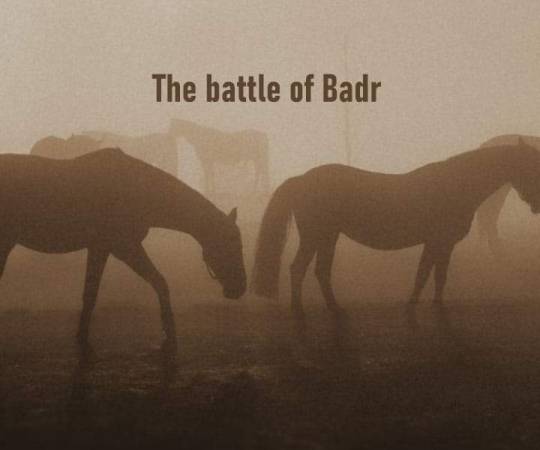
Battle of Badr – 17th Ramadan 2 A.H
“And indeed Allah assisted you at Badr when you were weak, so be careful (to your duty) to Allah so that you may be of the thankful ones. When you said to the believers 'Does it not suffice you that your Lord should assist you with three thousand angels sent down.'" [Qur'an 3:123-124]
The battle of Badr was the first of the great battles of Islam. When the Prophet (sallallahu alayhi wassalam) heard the news that there was a trade caravan going to Syria from Makka under the leadership of Abu Sufyan, he sent two men to gather information about it. It was discovered that it was a large caravan in which all the Makkans had shares. The Quraysh had decided to put all their savings into it and use the profits on arms, horses and other items of war to use against the Muslims. The news was disturbing.
The Prophet (sallallahu alayhi wassalam) left Medina with 313 men, 2 horses and 70 camels to go to Badr, which was a stopping point for the caravans. The Quraysh had confiscated all the property of all the Muslims who had left Makka for Medina and the Prophet (sallallahu alayhi wassalam) therefore decided to confiscate the property of the caravan in compensation. Abu Sufyan feared an attack from the Muslims and sent a messenger to Makka telling them of his fears. On receiving the message, an army of 1000 men, 100 horses and 700 camels under the leadership of Abu Jahl left Makka to go to Badr. Meanwhile Abu Sufyan took a different route back to Makka avoiding Badr. Once he was back in Makka he called Abu Jahl but Abu Jahl was too proud and desired to crush the Muslims with his large army.
The two armies met at Badr on 17th Ramadhan 2 A.H. In the beginning as per Arab custom, single combat (one to one) took place. The famous Quraysh warriors Utbah, Shayba and Walid came to challenge three 'Ansaars' from Medina. The Quraysh refused to fight any of the 'Ansaars', demanding their 'equals' and so the Prophet (sallallahu alayhi wassalam) sent Ubayda, Hamza and Ali. The three Kuffar were killed (Ubayda was hurt).
The Quraysh grew disturbed and began attacking. When the fierce engagement grew during the battle, the Prophet (sallallahu alayhi wassalam) began to supplicate to his Lord saying, "O Allah! Should this group (of Muslims) be defeated today, You will no longer be worshipped."
This was an Islamic duty, for all victory comes from Allah. Allah revealed, "Verily, I am with you, so keep firm those who believed. I will cast terror into the hearts of those who have disbelieved." [Qur'an: 8:12]. It can also be clearly seen from the above accounts that Muhammad (sallallahu alayhi wassalam) was also mindful of his (sallallahu alayhi wassalam) other duties to Allah. Islam required him (sallallahu alayhi wassalam) not only to make du'a for victory over the Disbelievers but also for his (sallallahu alayhi wassalam) Islamic State to undertake economic, political and military actions that were in line with this objective and which he (sallallahu alayhi wassalam) performed in order to seek Allah's victory.
During the Battle of Badr, Allah, inspired to His Messenger (sallallahu alayhi wassalam), "I will help you with a thousand of the angels each behind the other in succession." [Qur'an 8:9]. The Prophet (sallallahu alayhi wassalam) rested after the strain of this revelation and then raised his head joyfully, crying, "O Abu Bakr, glad tidings are there for you, Allah's victory has approached, by Allah, I can see Gabriel on his mare in the thick of a sandstorm."
The enemies got frightened and began to retreat. Kuffar were killed including their leader Abu Jahl; 14 Muslims were martyred. The Muslims also took 70 prisoners. The prisoners were treated with kindness and some became Muslims.
In later days some of the prisoners said: "blessed be the men of Medina, they made us ride whilst they walked, they gave us wheat and bread to eat when there was little of it contenting themselves with plain dates." The rich prisoners paid ransom and were set free. Others were asked to gain their freedom by each teaching 10 Muslims to read and write. The Battle of Badr reflected the strong ideological bond between the Muslims.
Before Islam, an Arab would look down upon a black person for no other reason than the color of his skin, and tribes would fight and kill one another for decades in the name of family pride. Islam established itself so firmly within the hearts of humans that, upon declaring their allegiance to Islam they would willingly shed away all of their previous affiliations to enter into the Brotherhood of Islam. For the Muslims, the color of skin, the family name, the geographic origin, or the wealth of the individual did not matter. When the Prophet (sallallahu alayhi wassalam) began his Da'wah, he (sallallahu alayhi wassalam) established a core of leadership consisting of a Persian, a Roman, an African, people from among the Jews and Christians, and indigenous Arabs, and nothing bound them together but the idea they embraced.
26 notes
·
View notes
Text
Shaykh al-Islām ibn Taymīyyah رحمه اللّٰه said :
"Seeking guidance from the people of misguidance is the greatest [form of] ignorance (jahl)."
[Majmūʿ al-Fatāwa, no. 4/21]
9 notes
·
View notes
Text
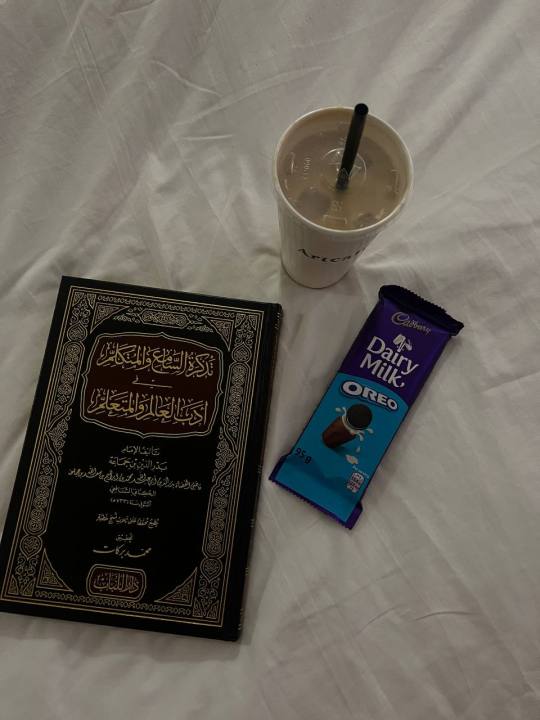
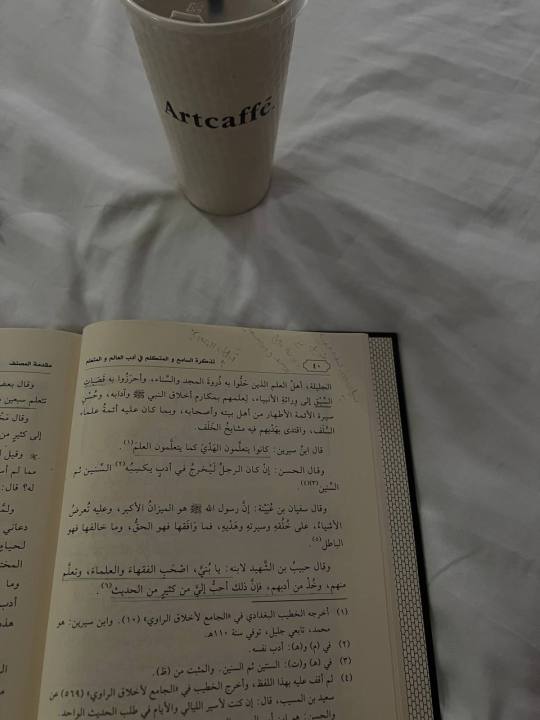
Some of the salaf used to say:
خير المواهب العقل وشرّ المصائب الجهل
The best thing that a person can be gifted with is aql (intellect), and the worst thing that a person can be afflicted with is jahl (ignorance).
تذكرة السامع والمتكلم ١/٨
#islamicreminder#islamicadvice#islamicart#islamicquotes#islamic#islam#quote#allah#hijab#knowledge#inspirational quotes#islam4 life#jilbab#la ilaha illa allah#quranic#quran online#quran kareem#holy quran#quran#hadith
24 notes
·
View notes
Text
In Surah Al A’raf ayah #1, Allah tells Prophet SAW that He sent the Quran down to him. Out of All the people, He gave this huge blessing to him. So, he should not be distressed about this book and should not feel constricted or anxious about it.
Why was he feeling constricted or distressed about the book of Allah?
Because he had to go out and recite it to the people of Makkah, he had to tell the people that what they were doing was wrong. It was a difficult task.
Why was it a difficult task? Because when he recited the Quran, there were some people who heard it and accepted Islam, and then there were people who listened and objected. They made fun of him, mocked him, ridiculed, and publicly humiliated him. In this ayah, Allah told him that he should not be distressed or feel constricted; rather, he should be confident that he has been chosen for this task.
Once the Prophet SAW was near the Kaaba, praying salah. Abu Jahl and his friends were watching him and saying, “look at this show off”, and then they brought dunk, blood, and the inner intestines of the camel and put it on his head while he was in sajdah. He SAW was stuck, and he couldn't get up. And after all this humiliation he suffered through them, he was told that go and give the message of the Quran to them.
Someone who has insulted us in the past, we cannot even talk to them properly, and the Prophet SAW had to go and convey the Quran to them. So, Allah was comforting him here, that you are the chosen one, I know it's a difficult thing to do, but there shouldn't be any discomfort in your heart; you should be confident.
Sometimes we face a lot of opposition from people. People publicly humiliate us. Oppose us. Embarrass us. We know that we cannot open our mouths. Because the people are gonna say, “oh, but you did this, or you said that.” They’re not gonna look at what others said to us or did to us; they’re just gonna point out what we did in response to their injustice.
People don’t care about what others say to us or do to us; most of the time, the focus is on how we react.
The Prophet SAW has also been instructed that you cannot retaliate. You cannot fight with these people. Rather, you have to be patient. Allah tells him that there should be no uneasiness in his heart; he should be confident so that he can keep going.
The same lesson is for us. Let’s develop some confidence in our hearts so that we can keep going against all the oppression we face from people. We should find comfort in knowing Allah knows the truth, and he will give us peace. This should give us the confidence to lead our life with respect.
#allah#quran#ayah from quran#lessons from quran#islamdaily#islam#motivating quotes#quotes#prophetsaw
32 notes
·
View notes
Text
The Life of The Prophet Muhammad(pbuh): Calling the Tribes to Islam, the Allegiances of Aqaba and Migration to Madinah
The Prophet Receives Permission For Migration
The Qurayshi polytheists had decided to kill the Messenger of Allah and started to do things to this end. Meanwhile, God Almighty gave the Messenger of Allah the order to migrate.
The Prophet used to visit Hazrat Abu Bakr in the morning or in the evening every day. However, when he received the order to migrate, he went to Abu Bakr’s house at noon, when it was very hot, by wrapping his head. When Abu Bakr was informed that the Prophet arrived, he was surprised and said, “By Allah, the Messenger of Allah never used to come at this time. There is something very unusual!” Then, he invited the Prophet inside and let him sit on the mattress and said, May my father and mother be sacrificed for you, O Messenger of Allah! What is the matter?”
The Prophet said, “Allah gave me the permission to leave Makkah and to migrate to Madinah.”
Hazrat Abu Bakr asked excitedly, “Will I be honored to accompany you, O Messenger of Allah?”
When the Prophet said “Yes…”, he became very happy and started to weep for joy.
Hazrat Aisha said, “Up to that time, I had never seen anyone to weep so much for joy!”, expressing the joy of her father at that time.
The Messenger of Allah and Hazrat Abu Bakr made an agreement with Abdullah b. Urayqit, who was a polytheist then but who was well-known as a trustable person who always kept his promise, to guide them to Madinah. They gave him two camels and agreed to meet at the foot of the Thawr Mountain.
Then the Prophet left the house of Abu Bakr and returned home.
Information Given by Hazrat Jibril
Meanwhile, Jibril (pbuh), the angel of revelation, came to the Prophet, informed him about the decision of the polytheists and instructed him what to do:
“Tonight, do not sleep in the bed that you used to sleep up to now!”
Thereupon, the Messenger of Allah called Hazrat Ali and said to him, “Sleep in my bed tonight! Take this green cardigan of mine and cover yourself in it! Do not fear! Nothing will happen to you!”
He also told Hazrat Ali to stay in Makkah until he returned the goods trusted to the Prophet to their owners.
Makkans trusted the Prophet, whom they named “Muhammadu’l-Amin” very much and they entrusted their valuable goods, which they feared losing, to him. When the Qurayshi notables decided to kill him, there were many valuable goods entrusted to him. Despite this decision, he ordered Hazrat Ali to return the goods to their owners, showing his dignity and trustability.
The House of the Prophet is Surrounded
In accordance with the plan that had been made, about two hundred polytheists with their swords chosen from all of the tribes gathered in front of the house of the Prophet after one third of the night passed. Among them were protagonists and brutal people like Abu Jahl, Abu Lahab and Umayya b. Khalaf. The murderers were waiting for the night to end, the sun to rise and the Prophet to leave his house. According to their customs, it was a mean and cowardly act to kill someone in his house.
The Prophet leaves his House
The Messenger of Allah left his house while the murderers with swords were around his house. He picked a handful of soil and threw it toward their heads, reading the first eight verses of the chapter of Yasin. None of them could see him and he passed through them.
After a while, some of their fellow citizens went over them and asked them, “Why are you waiting here?”
When polytheists said, “We are waiting for Muhammad”, they said, “Muhammad threw some soil toward your heads and left a long time ago. Look at your heads and clothes!”, virtually mocking the murderers!
They looked at one another. They were covered with dust and dirt. They were surprised. They entered the house at once. They saw someone lying covered with a cardigan. They said, “There he is; Muhammad is sleeping!” and continued waiting until it started to dawn.
When they saw that Hazrat Ali got up from the bed instead of the Messenger of Allah, they were astonished and said, “By Allah, what was said to us was true!”
Then they asked Hazrat Ali, “Where is Muhammad?”
When Hazrat Ali said, “I do not know!”, they were astonished and did not know what to do.
God almighty stated the following in the verse that He sent down upon this event:
“Remember how the unbelievers plotted against thee, to keep thee in bonds, or slay thee, or get thee out, (of thy home). They plot and plan and Allah too plans but the best of planners is Allah.”
THEY GO TO THE CAVE OF THAWR
After leaving his house, the Messenger of Allah went straight to the house of Hazrat Abu Bakr. They prepared some things for the expedition and put some food in a leather bag.
Then, the Messenger of Allah and Hazrat Abu Bakr left the house through the small door at the back of the house. They set off to Thawr Mountain, which is down in the southeast of Makkah, three miles (about an hour) away from the city.
Hazrat Abu Bakr walked sometimes in front of and sometimes at the back of the Prophet. The Prophet asked him, “O Abu Bakr! Why do you do so?” Hazrat Abu Bakr said, “In order to watch and protect you, O Messenger of Allah!
A Snake Bites Hazrat Abu Bakr
They arrived at the Cave of Thawr on Thursday night.
The cave was desolate. First, Hazrat Abu Bakr entered the cave. He cleaned the ground and leveled it. He blocked the holes in the cave with pieces of fabric torn off his garment. When the pieces were not enough, he blocked the last hole by putting his foot on it. Then, he called the Prophet inside the cave. The Messenger of Allah put his head on the knees of Abu Bakr and fell asleep.
After a while, Hazrat Abu Bakr felt a great pain in his foot that he had put on the hole. He realized that a snake had bitten him. However, he did not remove his foot. He did not even move lest the Messenger of Allah should wake up. He was in so much pain that tears fell down her face. When a few tears hit the face of the Messenger of Allah, he woke up and asked, “What is the matter, O Abu Bakr?”
Hazrat Abu Bakr, the symbol of loyalty, said, “O Messenger of Allah! Something bit my foot but it does not matter. May my father and mother be sacrificed for you!”
The Messenger of Allah rubbed the place that the snake bit with his spit. By the grace of Allah, the pain was eliminated and Hazrat Abu Bakr recovered.
A Spider Weaves a Web; Pigeons Build a Nest
Meanwhile, upon the command of Allah, a spider came to the entrance of the cave and weaved a web; and two pigeons came and built a nest. Those animals started to keep guard in order to protect the Messenger of Allah and Hazrat Abu Bakr against Quraysh!
Makkah is searched thoroughly
When the polytheists could not find the Prophet in his house, they got very distressed and sad. They started to search Makkah thoroughly at once. They went to the house of Hazrat Abu Bakr. When they could not find them there, they got furious.
When they could not find the Messenger of Allah in Makkah, they hired a town crier, who shouted, “We will give one hundred camels to anyone who fetches or kills Muhammad or Abu Bakr!”
When the announcement was heard, all of the thieves, murderers and criminals took their swords and sticks; they went out of Makkah and started to run around.
Some searchers hired two trackers from Banu Mudlij. They found the footprints of the Messenger of Allah and Hazrat Abu Bakr. They reached the foot of the Thawr Mountain by tracking.
One of the trackers said, “By Allah, they did not go beyond that cave. The footprints cease here!”
Some of them went to the entrance of the cave together with Umayya b. Khalaf.
Hazrat Abu Bakr’s Sorrow
Meanwhile, the Prophet and Hazrat Abu Bakr could see the polytheists but the polytheists could not see them.
Hazrat Abu Bakr was in panic and sorrowful. He said, “O Messenger of Allah! I would not feel sorry at all if they killed me. I am only an individual. However, if they harmed you, it would cause the destruction of your ummah!”
The Messenger of Allah said securely, “Have no Fear, for Allah is with us”, consoling him.
Hazrat Abu Bakr said, “O Messenger of Allah! If one of them bends down and looks, he will see us!”
The Messenger of Allah said in a safe and trusting voice, “O Abu Bakr! What do you think will happen if the third person who is present here along with two of us is Allah? Do you think you will be caught?” Then, he prayed Allah to make Hazrat Abu Bakr relieved.
Allah indicates the incident in the Quran as follows:
”If ye help not (your Leader) (it is no matter): for Allah did indeed help him; when the unbelievers drove him out: he had no more than one companion: they two were in the cave, and he said to his companion “Have no Fear, for Allah is with us”: then Allah sent down His peace upon him, and strengthened him with forces which ye saw not, and humbled to the depths the word of the Unbelievers. But the word of Allah is exalted to the heights: for Allah is Exalted in might, Wise.”
The Spider and the Pigeons Keeping Guard
The polytheists who came close the Cave of Thawr said, “Let us search this cave.”
The Messenger of Allah and Hazrat Abu Bakr could hear what they were talking.
One of them approached the entrance of the cave but he returned without looking inside the cave.
The others asked, “Why did you not look inside?”
He said, “I saw two wild pigeons had built a nest on the entrance of the cave. I never think they can be inside!”
Umayya b. Khalaf, a ferocious polytheist, shouted at his friends furiously,
“Why do you still walk around that cave? Do you not see that a spider had woven a web? By Allah, I think that web had been woven before Muhammad was born!”
Thereupon, they moved away from the cave.
Thus, God Almighty protected His Messenger against Quraysh through the spider and the wild pigeons He appointed!
Days in the Cave
Our beloved Prophet, who entered the cave of Thawr on Thursday night with Hazrat Abu Bakr, stayed in the cave on Thursday, Friday and Saturday nights. They stayed in the cave for three days and nights as a precaution. During this period, the polytheists would think that they had left Makkah and would loosen the search. And it happened like that.
During the period when they hid in the cave, upon the instruction of the Prophet, Abdullah, the son of Hazrat Abu Bakr, walked among the Qurayshis during the day and found out what they were talking and thinking about; at night, he went to the cave and told the Messenger of Allah what he had heard. He stayed in the cave and returned to Makkah at dawn.
Meanwhile, Amir b. Fuhayra, the slave of Hazrat Abu Bakr, were herding sheep nearby and erasing the tracks of Abdullah; he also took some milk to them.
Thus, three days and nights passed. The search of the Qurayshis for the Messenger of Allah and Hazrat Abu Bakr had loosened. That was the news brought by Hazrat Abdullah.
Meanwhile, as they had agreed beforehand, Abdullah b. Urayqit arrived at the foot of the Thawr Mount with the two camels delivered to him beforehand and his own camel on Monday morning at dawn.
Hazrat Asma Brings Food for the Journey!
A sheep was slaughtered and cooked for the Prophet and the people on the journey. Asma (may Allah be pleased with her), the daughter of Hazrat Abu Bakr, put the meat in a leather bag and took it to the cave along with a leather bottle full of water.
Hazrat Asma had forgotten to bring a band or rope to tie the mouth of the leather bag and bottle. She looked around but could not find anything to tie the bags. Then, she took off her waistband and divided it into two. She tied up the leather bag with one piece and the leather bottle with the other. Thereupon, the Messenger of Allah said, “There are two bands for Asma in Paradise!”
Therefore, Hazrat Asma is called “Dhat an-Nitaqayn [The One with two Waistbands]”.
LEAVING THE CAVE OF THAWR
It was the fourth Monday of the month of Rabiulawwal.
It was time to leave the cave.
Hazrat Abu Bakr presented the better one of his two camels to the Prophet and said, “May my father and mother be sacrificed for you, O Messenger of Allah! Get on it!”
The Messenger of Allah said, “I will not get on a camel that I do not own!”
Hazrat Abu Bakr said, “It is yours! May my father and mother be sacrificed for you. Get on it!”
The Messenger of Allah said, “No, I won’t” “I will not get on it unless you tell me the price you have paid for it!”
Hazrat Abu Bakr had to tell the price of the camel and the Prophet accepted to pay for it.
The Messenger of Allah and Hazrat Abu Bakr got on the camels. Hazrat Abu Bakr also let his freed black slave Amir b. Furayha get on the back of his camel so that he will serve them on the way.
Abdullah b. Urayqit, who was very good at leading the way, was in front of them. They left the Cave of Thawr.
The Prophet Calls out to Makkah
The Prophet was about to leave the holy city he was born in and grew up. He stopped his camel near the place called Hazrawa. He looked at the holy city sadly and said, “By Allah, you are the best place that Allah created. You are the most beloved one in the sight of Allah. There is no city more beloved and beautiful than you for me. If I were not forced, I would never leave you and would not settle anywhere else.” , expressing his love toward Makkah.
Thereupon, God Almighty sent down the following verse to console His Prophet:
“Verily He Who ordained the Qur'an for thee, will bring thee back to the Place of Return.”
They followed an unusual way toward Madinah in order to make it difficult for the enemies to follow them and to deceive them. First, they rode south, toward Tihama, which is near the Red Sea. Then, they turned north. They proceeded on the way parallel to the coast. They rode the camels until Tuesday noon without stopping. They stopped to have a rest on Tuesday in a shade. The Prophet started to sleep. Hazrat Abu Bakr was waiting like a guard next to him. He also watched around. He saw a shepherd at a distance. He went over to him. He took some milk from the shepherd and brought it to the Prophet. He gave it to the Messenger of Allah when he woke up. The Prophet drank it thirstily.
Milkless Goat Gives Milk
Strange incidents took place during the journey.
They went over to the shepherd and asked for some milk. He said, “I have nothing with me that can give milk except that goat. It is pregnant and went dry.”
The Messenger of Allah reached his hands out to the udders of the goat. He rubbed them with his hands. The udders got full of milk. They all drank the milk.
The shepherd was astonished. He said, “Tell me for Allah’s sake, who are you? I have never met someone like you!”
The Messenger of Allah said, “I will tell you if you keep it a secret!”
When the shepherd said, “OK. I will.”, the Prophet said, “I am Muhammad, the Messenger of Allah!”
The shepherd was more astonished now. He said, “So, you are the person that the Qurayshis say, ‘He went astray. Is that right?”
The Prophet said, “That is what they say!”
Thereupon, the shepherd said, “I witness that you are a prophet! What you have brought is true. Only a prophet can do what you are doing. I will follow and obey you.” Thus, he became a Muslim.
The shepherd said that he also wanted to go with them. However, the Messenger of Allah said, “You cannot do it today. When you hear that I become successful, then, come and join us.”
#allah#revert#reverthelp#islam#muslim#quran#god#convert#prayer#convert islam#revert islam#revert help#revert help team#islamhelp#converthelp#how to convert to islam#convert to islam#welcome to islam
8 notes
·
View notes
Text

Badr is a town which is located 130 km from the Holy city of Madina. It was the location of the Battle of Badr.
The battle of Badr was won by a small group of Muslims against a large army on the 17th of the month of Ramadan 2 A.H. It was the first of the great battles of Islam.
After Holy Prophet Muhammad (s) and the Muslims left Makkah and came to live in Madina, his enemies still did not leave them alone to live in peace. They wanted to put an end to Islam. So they gathered a huge army and attacked the Muslims.
Abu Jahl with 1000 soldiers came to a place called Badr, which was between Makkah and Madina.
It was the most important battle for Islam. The Holy Prophet (s) took with him 313 brave Muslim soldiers. Fear filled the hearts of many. It was a test of faith.
#islamdaily#welcome to islam#mustshare#sharethis#like and/or reblog!#pls share#pls reblog#ahlulbayt#shia muslim#prophet muhammad#ali ibn abi talib
2 notes
·
View notes
Text
REFLECTIONS ON THE QUR'AN: Sūratu’l-An‘ām (Cattle): Part 3
3. Linguistic aspect of the Divine Message
Just like the verse, “God knows best upon whom (and in what language) to place His Message,” there exists many verses throughout the Qur’ān stating clearly that the Qur’ān was revealed in Arabic. This fact proves the exceptional position of the Arabic language, especially in that era. Arabic was living its golden age when the Qur’ān was revealed. Actually, there is a golden age for every language. For instance, the Elizabethan era or the present age can be considered to be the golden age of English. They did not commit the error that we did in language by alienating ourselves against our past and narrowing down our vocabulary. English has remained open to borrowing words from other languages and interaction with various other cultures. The English people have always been respectful of the Elizabethan era. Likewise, the era of Qur’anic revelation may be considered the golden age of the Arabic language, when its grammatical, semantic, lexical, and stylistic dimensions were established, and even the simplest expressions were almost wonders of art. The Qur’ān was revealed in the dialects of the Mudar Clan and the Quraysh Tribe. Yet, it was open to various other dialects as well.
A great number of people to date have worked on the literary aspect of the Qur’ān. Also, many great scholars have come out in this area. Abdu’l-Qāhir al-Jurjāni, as-Sakkāki, az-Zamakhshārī, Muhammad Sādiq ar-Rāfi‘ī, Sayyed Qutb, and Bediüzzaman Said Nursi—the author of Ishārātu’l I‘jāz (Signs of Miraculousness)—are only a few among those great scholars.
Since the time of its revelation, the Qur’ān has always challenged its opponents with its eloquence and miraculousness. Many litterateurs and people of eloquence have tried to imitate the Qur’ān, yet all of them have been bitterly frustrated. On the other hand, many friends of the Qur’ān have beautified their words, poems, and articles with its verses, yet those people have never achieved the exact beauty of the Qur’ān. Recited today by hundreds of millions, the Qur’ān smiles at us from the highest point of the heaven of Revelation like a most shiny star and tells us the inimitability of its way of expression. A lot of poets and litterateurs during the years of its Revelation were enchanted by the words of the Qur’ān and submitted to it by listening to it only once. Many others such as Walid ibn Mughīrah, Utba ibn Walid, and Abū Jahl were charmed by it despite their severe antagonism, and they could not attempt to compete with even one of its verses. ‘Umar, who once said, “I can read a thousand couplets from memory from the literary legacy of the (pre-Islamic) Age of Ignorance without stopping,” was fascinated by the Qur’ān when he heard Sūrah Tā-Hā recited in his sister’s house when he was on his way to kill the Prophet, and he went to the Prophet ready to believe. According to the reports, everyone in Makkah was so familiar with poetry that if one stopped any person on a street and asked them, they could recite poems from memory for hours.
While the Qur’ān was being sent down as the Book of a new Religion, it was being revealed in such an immensely rich language with literary beauty and profundity. It had such a literary style and layers of meaning that it satisfied everyone with all levels of knowledge and understanding from an ordinary desert person to the experts of literature and sciences. Together with a desert person pasturing their camels, the most outstanding people of literature and sciences used to recite the Qur’ān with an indescribable enthusiasm and pleasure.
As it is stated in the verse under discussion, it is absolutely true that God is He Who knows best upon whom and in what language to place His Message. The Qur’ān was revealed in such a language and literary style that if a jurist refers to it, they suffer no troubles in achieving their goal. Likewise, an administrator, a theologian, or a commentator can easily find the fine points of their own specialized area in the Qur’ān and are enlightened. This is so despite the fact that each science—whether it is law or literature or theology or physics or the Qur’anic commentary and exegesis—has its own language. The Qur’ān considers all of these at the same time without injuring even their finest points, principles, and rules. Here we find the history of Islam, Islamic jurisprudence, schools of law, schools of literature, schools of thought, schools of the Qur’anic commentary and exegesis, and schools of other sciences, which have brought up thousands of specialists and experts. All of these schools have had their sources in the Qur’ān and have produced plenty of works because of it.
Indeed, God, the Almighty, is He Who “knows best upon whom, where, and in what language, to place His Message.” Actually it is most fitting here to say, “God is the only One Who knows upon whom, where, and in what language, to place His Message.” Besides Him nobody has the right to decide on this matter. It is, as the verse continues, abasement in this world and a severe punishment in the Hereafter that await those who want to interfere in God’s choice.
2 notes
·
View notes